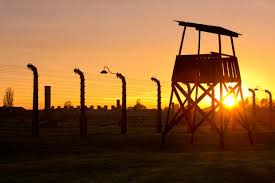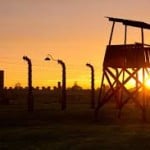I accompanied my grandfather, Howard Kleinberg, to Auschwitz where I heard him tell his harrowing – and miraculous – story to a group of students.
The sun is setting. The sky is pink and the temperature is perfect. I am standing 200 meters inside the gates of Auschwitz next to my grandfather, Howard Kleinberg. It’s been an emotionally draining and physically exhausting day for him. As we walk towards the exit of this painful place we come upon a group of 25 teenagers and six adult chaperones.
The group is from Casablanca, Morocco. They have a French translator with them. My grandfather smiles at them. His smile provokes their curiosity. “Survivor?” the translator asks. Having encountered many groups throughout our trip, it was clear to me these Moroccan teenagers had never met a Holocaust survivor, much less heard one speak. Howard flashes his credentials – his tattooed arm – evidence of his sojourn in this place. The group is intrigued and moves in closer.
In a few moments they become mesmerized by a story I have heard many times before. Their security guard looks anxiously at his watch and motions time is up. They must quickly leave. Yet it’s clear to me this group isn’t going anywhere for now.
The translator does his best to maintain his composure and meanwhile, the sun continues to set.
Most of the thousands of visitors to Auschwitz have already walked back to their buses. Yet here’s Howard Kleinberg, a man who endured the worst life could throw at him, a witness to the unimaginable and he’s ‘staying late’ so to speak, in a place he couldn’t wait to escape. The irony is not lost on me.
His testimony begins with a description of the cattle cars that transported him and thousands of others by rail to this infamous destination. He describes the claustrophobia, the stench, the fear, the sounds and the bizarre scene they encounter when the train stops and the doors open. It was September 1943.
He tells of the horrifying experience of entering ‘the shower’ knowing this was the end of the line. Then the euphoria of feeling water rather than gas pouring forth.
He wants them to understand slave labor and the unbearable conditions. He describes using an empty cement bag as a makeshift jacket to keep from freezing. His daily menu was one slice of moldy bread and a cup of watery soup with virtually no nutrients. He surely would have died in this camp but the Nazis needed slave labor elsewhere, so he was transported to another camp in Austria called Mauthausen.
Each night in Mauthausen after a grueling day of work, he and his fellow inmates were forced to strip down and run through snow to cold showers. This went on for 30 days until his group was reloaded onto trains and brought to their final destination: Begen Belsen.
When my grandfather arrives at the final part of his story the translator takes a deep breath. He tells the group about a place with no food, no sanitation, no work and no hope. It was literally a death camp.
On April 15th, 1945, the British army liberated Bergen Belsen. But by this point, my grandfather was a spent force. Possessing neither the physical strength nor the emotional will to fight on, he lay down to die beside a pile of corpse.
He expected death would come quickly, but then something strange occurred. “There were female voices hovering over me,” he says. A young girl was pleading with two older women to save him. The others were skeptical. If he wasn’t already dead he surely would be soon. But the young girl was persistent. In the end she convinced the others to help carry him to a room recently abandoned by German officers where the women tried to nurse him back to health.
But Howard was gravely ill and knew he needed a doctor. Except there were no doctors because the war was not yet over. He tells the group that one day he awoke and saw no one in the room. He decided to crawl out to the road. Fortunately, a military vehicle spotted him and transported him to a hospital where he received medical treatment. He stayed there for six months. By the time he was released the three women were long gone.
Several months later Howard received papers to go to Canada where he was reunited in Toronto with four siblings who had emigrated before the war. He found work, learned to speak English and began to rebuild his life.
A few months later he learned that the young girl who had saved his life, Nancy, had also made her way to Toronto. Eager to thank her in person he bought a corsage and went to pay her a visit. The two of them hit it off and began courting. Three years later, in March 1950, they married. He shows them pictures. Sixty-six years later and the two of them are still going strong.
The teenagers and the chaperones are in complete astonishment. They had never met a survivor and now they just heard one share one of the most extraordinary testimonies they will likely ever hear. They begin to cheer and dance and sing Am Yisrael Chai while Howard flashes his trademark smile. For nine decades that irrepressible smile has radiated hope, faith, optimism and love.
The sun has set over Auschwitz, but not for the Jewish People and certainly not for my Zaidy, Howard Kleinberg.

